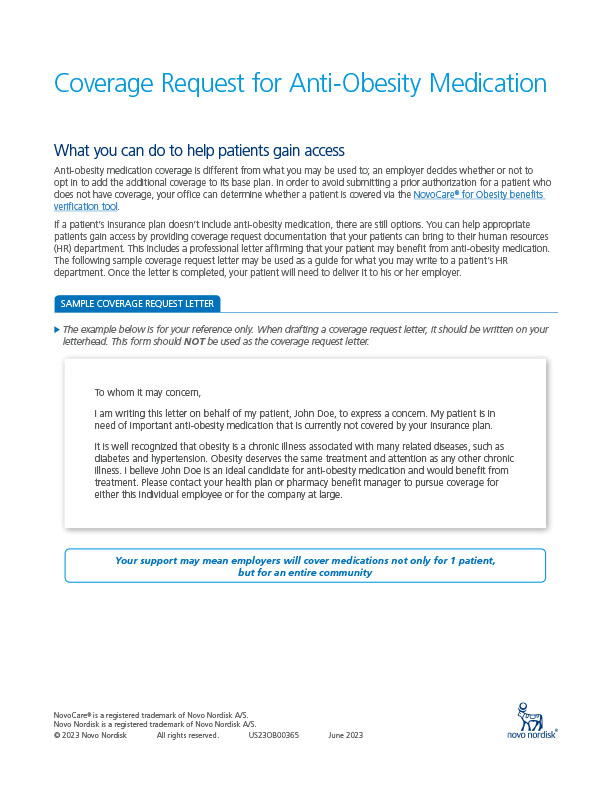You play an important role in your patients’ long-term goals for weight management
Learn what patients need from you, how to start the conversation and what treatment might entail.
You play an important role in your patients’ long-term goals for weight management
Learn what patients need from you, how to start the conversation and what treatment might entail.
Actor portrayal
Patients receiving HCP guidance lost 5x more weight than those in a self-directed program1,a
aA randomized, controlled study of 415 patients with obesity showed that patients lost more weight with HCP counseling, weight-loss coaches, and web-based support (5.2% weight loss) when compared with a self-directed program (1.1% weight loss) at 24 months. A meta-analysis of survey data indicated that weight-loss advice from HCPs has a positive effect on a patient’s attempt at behavior change and on weight-loss efforts.
Actor portrayal
Starting the conversation
about weight
A study showed that two-thirds of patients with obesity want their HCPs to initiate the conversation about weight.2 The right framework can help guide these discussions with your patients.
Approaching weight-management discussions
When starting the weight-management conversation with your patients with obesity, it’s important to express empathy and recognize successes. These strategies may be helpful3:
Approaching weight-management discussions
When starting the weight-management conversation with your patients with obesity, it’s important to express empathy and recognize successes. These strategies may be helpful3:
Ask open-ended questions – to encourage a 2-way dialogue
Review current progress – to recognize your patient’s efforts
Use reflective listening – to confirm your patient’s point of view
Include summary statements – to clarify your patient’s points and identify next steps
Ask open-ended questions – to encourage a 2-way dialogue
Review current progress – to recognize your patient’s efforts
Use reflective listening – to confirm your patient’s point of view
Include summary statements – to clarify your patient’s points and identify next steps
The role of pharmacotherapy in obesity management
Pharmacotherapy, in conjunction with lifestyle modifications, has been shown to produce greater weight loss compared to lifestyle modifications alone. It may be considered a component of a comprehensive, long-term weight-management plan for your appropriate patients.4,5
Guiding principles of pharmacotherapy
Reinforce patient efforts
Pharmacotherapy is intended to reinforce—not replace—lifestyle intervention efforts.6
Understand side effects
HCPs and patients should be familiar with a medicine’s potential side effects and contraindications.6
Every patient is different
If clinically meaningful weight loss of ≥5% is not achieved after 3-4 months, a new treatment plan should be implemented.6
Obesity management resources for your patients
- Appel LJ, Clark JM, Yeh H-C, et al. Comparative effectiveness of weight-loss interventions in clinical practice. N Engl J Med. 2011;365(21):1959-1968.
- Golden A, Dhurandhar NV, Jinnett K, et al. Insights and perceptions of obesity management in people with obesity: results of the National ACTION Study. Poster presented at: ObesityWeek 2016; October 31-November 4, 2016; New Orleans, LA. Poster T-P-3178.
- DiLillo V, Siegfried NJ, Smith West DS. Incorporating motivational interviewing into behavioral obesity treatment. Cogn Behav Pract. 2003;10(2):120-130.
- Garvey W, Mechanick J, Brett E, et al. American Association of Clinical Endocrinologists and American College of Endocrinology comprehensive clinical practice guidelines for medical care of patients with obesity. Endocr Pract. 2016;22(Suppl 3):1-203.
- Wadden TA, Berkowitz RI, Womble LG, et al. Randomized trial of lifestyle modification and pharmacotherapy for obesity. N Engl J Med. 2005;353(20):2111-2120.
- Bray GA, Frühbeck G, Ryan DH, Wilding JPH. Management of obesity. Lancet. 2016;387(10031):1947-1956.
